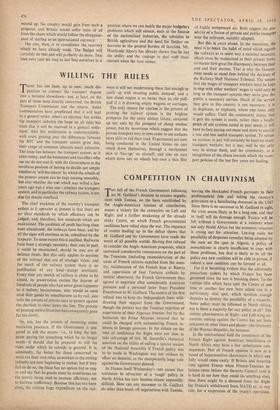WILLING THE RULES
The chief weakness of the country's transport system as, it operates at present is that there are no clear standards by which efficiency can be judged; and, therefore, few standards which are maintained. The yardstick of profit has long since been abandoned; the railways have been, and by all the signs will continue to be, subsidised by the taxpayer. To some extent this is justified. Railways have been a strategic necessity; their cost in part, it could be maintained, should be met out of defence funds. But this only applies to sections of the railroad that are of strategic value; and for much of the railway system there is no justification of any kind—except sentiment. Every time any stretch of railway is about to be closed, its preservation excites the interest of hundreds of people who had never given tuppence to it before; businessmen, who would as soon send their goods by wheelbarrow as by rail, join with the owners of private cars to protest against the decision to close down the line. The process of pruning useless branches has consequently gone far too slowly.
So, too, has the process of removing union restrictive practices. If the Government is pre- pared to will the means—i.e., to keep the lax- payer paying for something which he no longer needs—it should also be prepared to will the rules under which its subsidy is granted. It is, admittedly, far better for those concerned to work out their own rules, as workers in the mining industry are now beginning to realise; but if they fail to do so, the State has no option but to step in and say that its grants must be conditional on the money being used to increase efficiency, not to buttress inefficiency. Because this has not been done, the current huge expenditure on the rail- ways is still not modernising them fast enough to catch up with receding public demand; and a new diesel engine is no better than an old puff- puff if it is drawing enipty wagons or carriages.
The only reason for caution in the process of pruning the railway system is the brighter prospects for the more distant future, conjured up not only by the prospect of cheap nuclear power, but by inventions which suggest that the private transport may in time come to use surfaces more akin to rail than road. Experiments are now being conducted in the United States on cars which drive themselves, through a mechanism akin to `George' on aircraft; and also on cars which drive not on wheels but over a thin film of highly compressed air. Both suggest the pos- sibility of a fusion of private and public transport over the railroads, suitably adapted.
But this is years ahead. In the meantime, the need is to break the habit of mind which regards the railway's as in some way a national necessity, which must be maintained in their present form, no matter how great the discrepancy between their cost and their income. That is why the Govern- ment needs to stand firm behind the decision of the Railway Staff National Tribunal. The notion that the wages of transport workers must be kept in step with other workers' wages is valid only so long as the transport systems they serve give the public a necessary service. Much of the service they give in this country is not necessary; it is in duplicate, or triplicate, where one form only would suffice. Until the community insists that it gets.the system it needs, rather than a hotch- potch of old systems suited to past needs, it will have to face paying out more and more to sustain a less and less useful transport system. To refuse an increase in pay will certainly be hard on many transport workers; but it may well be the only way to arouse them, and the community, to a recognition of the chaos towards which the trans- port policies of the last few years are leading.




























 Previous page
Previous page